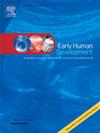肠道菌群作为新生儿坏死性小肠结肠炎的风险和保护因素:一项综合综述
IF 2
3区 医学
Q2 OBSTETRICS & GYNECOLOGY
引用次数: 0
摘要
坏死性小肠结肠炎(NEC)以胃肠道炎症和肠道坏死为特征,主要影响早产儿。它是这一人群发病和死亡的主要原因之一。本文旨在结合近年来的科学文献,分析肠道菌群与早产儿NEC发病的关系,重点阐述其主要病理生理机制和预防策略。我们采用患者、干预、比较和结果(PICO)策略,在虚拟健康图书馆(VHL)和Pubmed数据库中进行了综合文献综述。最初共确定了178篇文章,并应用了经过验证的工具来评估研究的方法学质量。最后的样本包括13篇国际文章。主要研究结果表明,肠道生态失调、免疫途径激活和代谢改变是NEC发病的关键因素。另一方面,益生菌的使用和母乳的富集与有益效果有关。综上所述,NEC是一种与肠道生态失调相关的多因子疾病,致病菌增加,有益菌如双歧杆菌减少,细菌LPS激活促炎TLR4受体有利于肠道损伤。早产、抗菌剂的使用和母乳成分的变化等因素都有利于微生物群失衡。益生菌和母乳喂养是预防这种情况的有希望的策略。因此,本文收集了相关信息,可以帮助理解NEC所涉及的因素。本文章由计算机程序翻译,如有差异,请以英文原文为准。
Gut microbiota as a risk and protective factor in neonatal necrotizing enterocolitis: An integrative review
Necrotizing enterocolitis (NEC) is characterized by inflammation of the gastrointestinal tract and intestinal necrosis, primarily affecting premature neonates. It is one of the leading causes of morbidity and mortality in this population. This article aims to analyze, based on recent scientific literature, the relationship between intestinal microbiota and the development of NEC in premature neonates, highlighting the main pathophysiological mechanisms and prevention strategies. We conducted an integrative literature review, with search in the Virtual Health Library (VHL) and Pubmed databases, applying the Patient, Intervention, Comparison and Outcomes (PICO) strategy. A total of 178 articles were initially identified, with the application of validated tools to assess the methodological quality of the studies. The final sample included 13 international articles. The main findings show intestinal dysbiosis, activation of immune pathways and metabolic alterations as key elements in the pathogenesis of NEC. On the other hand, the use of probiotics and enrichment of breast milk were associated with beneficial effects. In conclusion, NEC is a multifactorial disease associated with intestinal dysbiosis, with an increase in pathogenic bacteria and a reduction in beneficial bacteria such as Bifidobacterium spp. The activation of pro-inflammatory TLR4 receptors by bacterial LPS favors intestinal damage. Factors such as prematurity, use of antimicrobials, and changes in the composition of breast milk favor microbiota imbalance. Probiotics and breastfeeding are promising strategies for preventing this situation. Therefore, this article gathers pertinent information that can help in understanding the factors involved in NEC.
求助全文
通过发布文献求助,成功后即可免费获取论文全文。
去求助
来源期刊

Early human development
医学-妇产科学
CiteScore
4.40
自引率
4.00%
发文量
100
审稿时长
46 days
期刊介绍:
Established as an authoritative, highly cited voice on early human development, Early Human Development provides a unique opportunity for researchers and clinicians to bridge the communication gap between disciplines. Creating a forum for the productive exchange of ideas concerning early human growth and development, the journal publishes original research and clinical papers with particular emphasis on the continuum between fetal life and the perinatal period; aspects of postnatal growth influenced by early events; and the safeguarding of the quality of human survival.
The first comprehensive and interdisciplinary journal in this area of growing importance, Early Human Development offers pertinent contributions to the following subject areas:
Fetology; perinatology; pediatrics; growth and development; obstetrics; reproduction and fertility; epidemiology; behavioural sciences; nutrition and metabolism; teratology; neurology; brain biology; developmental psychology and screening.
 求助内容:
求助内容: 应助结果提醒方式:
应助结果提醒方式:


